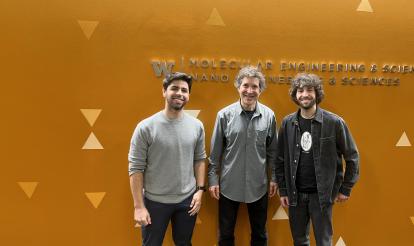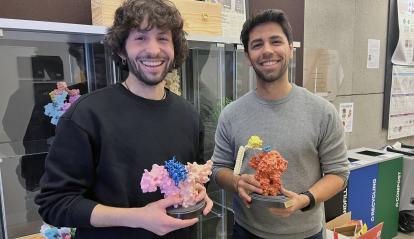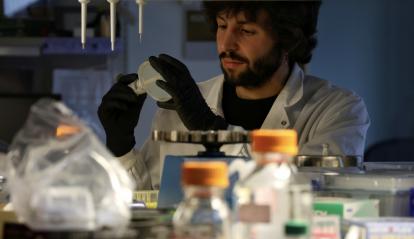
You are reading:

You are reading:

19.05.25
6 minutes readSend your questions to:
Estudiante de doctorado en Ingeniería Molecular en el
Baker Lab de la University of Washington
Doctor en Bioingeniería y Diseño Computacional de Proteínas, y director científico de Monod Bio
Marc Expòsit and Alfredo Quijano share more than just a vocation for science. Young, born in Spain and with a PhD from the prestigious University of Washington, they have both worked hand in hand with David Baker, the winner of the Nobel Prize in Chemistry 2024 and father of computational protein design. Their access to this PhD programme was not by chance, but with the support of the ”la Caixa” Foundation postgraduate fellowships abroad. Their careers reflect the impact of this initiative, which promotes talent and excellence in scientific and technical research at an international level.
Marc Expòsit (Girona, 1995) and Alfredo Quijano (Valencia, 1993) agree on the positive impact that the ”la Caixa” Foundation fellowship programme has had on their careers. It was a unique opportunity for both of them to gain access to world-leading institutions such as the Baker Lab of the University of Washington, a centre that has revolutionised the field of biotechnology with artificial intelligence models capable of designing proteins from scratch.
For Expòsit, the fellowship was the key to being accepted into the university’s PhD programme: “In addition to the funding, you enjoy the distinction of having received this fellowship, which is a point in your favour in the university selection process.”
Quijano also emphasises the support provided by the fellowship programme during the process: “It is very difficult to access the US education system if you don’t have someone to guide you, because it is very competitive and there are many administrative obstacles. The fellowship helps you to understand how it works.”

David Baker is one of the most influential figures in the field of computational protein design. His work with open-source artificial intelligence models has enabled the creation of entirely new proteins that do not exist in nature.
Proteins are made up of sequences of 20 amino acids that, when combined in different ways, determine their structure and function. “We would not have enough of all the atoms in the universe to test all the possible combinations in the laboratory,” explains Èxposit. “What David has done is to find algorithms that help us explore these possibilities in order to create proteins from scratch with new functions that allow us to change biology.”
The research of this biochemist and computational biologist has completely transformed the approach to many biomedical and environmental challenges, from developing new drugs and treatments to breaking down plastics. The committee that awarded him the Nobel Prize in Chemistry 2024 acknowledged the impact of his findings and the enormous benefits that this knowledge will bring to humanity.
The Baker Lab, the Seattle laboratory that bears his name, is a hotbed of talent and innovation. Baker fosters an environment where collaboration is key and teamwork drives scientific progress: “David always says that his lab is like a brain: the more connections there are between the neurons – the researchers – the smarter it is,” claims Expòsit.
As part of his PhD in molecular engineering under Baker’s supervision, Expòsit is working on the design of cytokines, small proteins that regulate the growth and activity of other cells in the immune system: “We are responsible for designing new response messages for the immune system in order to be able to treat diseases such as cancer or autoimmune disorders.”

For Quijano, his time at the Baker lab was a turning point, both in his research under Baker’s mentorship and in his subsequent career. During his PhD in Bioengineering and Computational Protein Design, he worked on designing proteins that alter their activity depending on their environment. Applying this project to cancer therapies led to the founding of his first company, Neoleukin Therapeutics, which focused on reducing the side effects of cancer treatments.
The same principle applied to diagnostics led to the publication in Nature of his study on the development of luminescent biosensors designed to detect biomarkers related to coronavirus, among other pathologies.
After completing his PhD, he continued exploring these lines of research and co-founded Monod Bio, where he currently works, together with David Baker and Daniel Silva, also a postdoctoral researcher at the Baker Lab. “We are the only company that is using protein design with artificial intelligence to improve two things: on the one hand, diagnostic tools, in other words, the proteins used in diagnostics to make them more accurate and sensitive, and on the other hand, the reagents used by researchers in the laboratory to provide them with cheaper, faster resources,” he claims.
The Nobel Prize has given the field an unprecedented boost, attracting more interest from the scientific community, industry and investors. “David Baker, who is a very modest person and whose priority is to continue his research, said that what made him most proud of winning the Nobel Prize was being able to share it with his parents, now that they are still alive, and the positive impact the prize can have on all of us working in the field,” Quijano recalls.
For Quijano, another strong point of the ”la Caixa” Foundation fellowships is the fellowship alumni community, a network of talent that remains active even after the fellowship has ended. “The fellowship programme is looking for students with initiative who want to study abroad and create something new. The ”la Caixa” Foundation invests in people and you realise this when you meet other fellowship holders,” he says.
This network of contacts has been key for both researchers in finding career guidance and accessing new opportunities. “I think it is a wonderful resource.
The fellowship creates this common ground with people who can give you advice and resolve your doubts. These are very valuable relationships,” Expòsit stresses. Thanks to this connection, he was introduced to David Baker’s work by Quijano, who recommended that he apply to the University of Washington.

Now in the final stages of his PhD, Expòsit is enthusiastic about his future. His long-term goal is to return to Catalonia, where he comes from, but in the near future he is considering the possibility of starting or continuing his training with a postdoctoral position in another laboratory in the United States.
For his part, Quijano is committed to consolidating his career at the junction between research and entrepreneurship in the field of biotechnology. His aim is to promote the work of researchers and help to develop more accurate and accessible diagnostic tools.
Both agree that the ”la Caixa” Foundation fellowship has been a decisive factor in their academic and professional careers. For Quijano, it represents a unique opportunity for future researchers: “I recommend that young people apply without hesitation. I will always be grateful for the ”la Caixa” Foundation fellowship, and I am happy to help new generations in any way I can.”